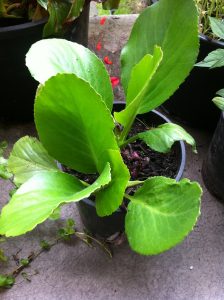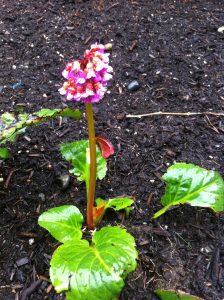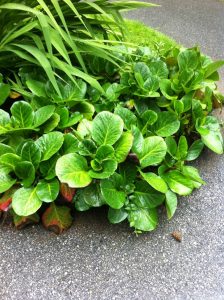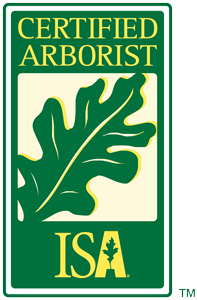First contact
My first encounter with Bergenia cordifolia was several years ago with my manager. She bent down and furiously started rubbing the leaves to demonstrate how the plant got its common name ‘pigsqueak’. And so we all rubbed the leaves to learn our lesson. Some no doubt turned their thoughts to bacon.
2016
Fast forward to 2016. Out on a site walk with my boss and the garden liaison, I was shocked when the lady asked us about removing a huge clump of Bergenia. What? Really? One person decides on a large landscape edit? They obviously had not flowered yet and they were in a perfect location close to a sidewalk. Bergenia form nice clumps but don’t spread quickly. Luckily the lady got side-tracked with other projects.
Then, at home one day in summer, seeking happiness by de-cluttering, I ran into a clipping from March 2008. It was a Garden West magazine article by Carol Hall. In it she correctly defends Bergenias. Finally, one person that made sense. Let the pigs squeak. Forever.
Plant details
Siberia and Himalayas native, this early-blooming perennial is tough as nails. Once it is established, it requires very little maintenance. I remove any brown leaves before liaisons get upset; and I remove spent flower stalks. That’s it.
Hall thinks that Bergenia’s lack of popularity stems from being stuck in 4 inch nursery containers. To fully appreciate the plant you have to see it established in your garden. I believe she is right. See my pictures below.
Other than situated by sidewalks, Bergenias are also good for front border definition and as year-round accents in mixed landscaping. You can also mass them under deciduous trees.
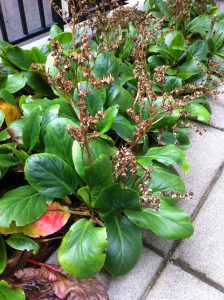
Much better in a clump. Note the only real maintenance: snip out spent flower stalks and remove any brown leaves.
Give Bergenia cordifolia a chance in your garden.


